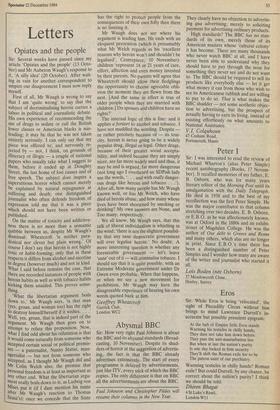Letters
Opiates and the people
Sir: Several weeks have passed since my article 'Opiates and the people' (13 Octo- ber) and Mr Auberon Waugh's response to it, 'A silly idea' (20 October). After wait- ing in vain for another correspondent to umpire our disagreement I must now reply myself. First of all, Mr Waugh is wrong to say that I am 'quite wrong' to say that the subject of decriminalising heroin carries a taboo in political and journalistic debate. His own experience of recommending the use of drugs to sedate or cull the British lower classes or American blacks is mis- leading; it may be that he was not taken entirely seriously. I can only say that my piece was offered to, and nervously re- jected by — not, I think, on grounds of illiteracy or illogic — a couple of national papers who usually take what I suggest to them, before it ended up at Doughty Street, the last home of lost causes and of free speech. The subject does inspire a superstitious horror which cannot merely be explained by natural repugnance at suffering and death: one distinguished journalist who often defends freedom of expression told me that it was a piece which should not have been written or published. On the matter of toxicity and addictive- ness there is no more than a semantic quibble between us, despite Mr Waugh's dismissal: Wheatcroft 'is neither para- doxical nor clever but plain wrong.' Of course I don't say that heroin is not highly toxic or habit-forming; only that in these respects it differs from alcohol and nicotine in degree (however much) and not in kind. What I said before remains the case, that there are recorded instances of people with heroin habits as well as with tobacco habits kicking them unaided. This proves some- thing. 'What the libertarian argument boils down to,' Mr Waugh says, 'is that man (yes, groan, and woman too) has the right to destroy himself/herself if it wishes. . . Well, yes, groan, that is indeed part of the argument. Mr Waugh then goes on to attempt to refute this proposition. Now, what I find odd about his refutation is that it would come naturally from someone who accepted certain social or political premis- ses — a paternalist, Nanny Statist, man- agerialist — but not from someone who accepted, as I thought Mr Waugh did and Mr Colin Welch also, the premise that Personal freedom is at least as important as any other end. What the libertarian argu- ment really boils down to is, as Ludwig von Mises put it (if I dare mention his name after Mr Waugh's reaction to Thomas Szasz's): once we concede that the State has the right to protect people from the consequences of their own folly then there is no limiting it. Mr Waugh does not see where his argument is leading him. He ends with an eloquent peroration (which is presumably what Mr Welch regards as his 'excellent reasons why heroin won't and shouldn't be legalised', Centrepiece, 10 November): children 'represent 18 or 21 years of care, effort, affection and even money invested by their parents. No parents will agree that Wheatcroft should allow their fledglings the opportunity to choose agreeable obli- vion the moment they are flown from the nest. [And the same in effect is true of older people when they are married with children.] Do spouses and children have no rights?' The internal logic of this is fine: and it applies a fortiori to alcohol and tobacco. I have not muddled the wording. Despite or rather precisely because of — its toxi- city, heroin is never going to be a widely popular drug, illegal or legal. Other drugs, because of their greater social accepta- bility, and indeed because they are simply nicer, are far more widely used and thus, it may be and is argued, far more dangerous (not long ago I overheard an SDPish lady use the words, . . and with really danger- ous drugs like heroin and tobacco . . .'). After all, how many people has Mr Waugh known well, or has Mr Welch, who have died of heroin abuse; and how many whose lives have been shortened by smoking or drinking? My own answers are None, and Too many, respectively. We all know, Mr Waugh says, that this talk of liberal individualism is whistling in the wind; 'there is not the slightest possibil- ity that any sane democratic government will ever legalise heroin.' No doubt. A more interesting question is whether any foreseeable government — let's leave 'sane' out of it — will criminalise tobacco. I should say that it is quite possible; with an Extreme Moderate government under Dr Owen even probable. When that happens, or when we see a new movement for prohibition, Mr Waugh may have the disagreeable experience of hearing his own words quoted back at him.
Geoffrey Wheatcroft
Garrick Club, London WC2






































































 Previous page
Previous page